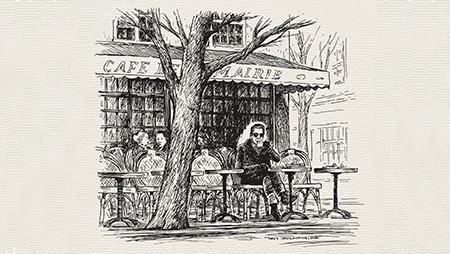INSPIRATION • April 2020
The world's most brilliantly untranslatable words
Why would there be a word for something in one language, but not in another? Such phrases may not abide by the laws of translation, but they do offer a window into the inner lives of their speakers. Polyglot Rebecca Naylor talks us through some of the most enlightening – and baffling – mots justes from around the world

L’esprit de l’escalier
Language: French
Have you ever needed a phrase to describe those times when you think of the perfect response, but it comes to you just that bit too late? Hesitate not – the French have it covered. L’esprit de l’escalier or ‘staircase wit’ was first coined by French philosopher Denis Diderot. Upon leaving a particularly sour dinner party, poor Diderot only thought up the witty comeback the situation required as he reached the bottom of the stairs to make his exit. We’ve all been there, Diderot.

Petrichor
Language: English
While all Brits are surely familiar with the notion of this one, they won’t necessarily be acquainted with the name. Petrichor is the term used to describe the pleasant, earthy scent produced when rain falls on dry soil (if it ever dries, that is). Petrichor’s etymology is actually Greek, constructed from petra, meaning stone, and ichor, the liquid that flows in the veins of the Gods in Greek mythology.

Utepils
Language: Norwegian
Did you know there is a Norwegian word for enjoying a beer in the sun? Utepils literally translates as ‘outdoors lager’, though it has taken on several different interpretations throughout the generations. Perhaps the most Norwegian of the bunch is its most popular: ‘the first beer of the season outdoors on a sunny day’. And, for those living through the long, dark months of a Norwegian winter, the first utepils of the season (albeit drunk while wrapped up in a blanket) is an annual rite we can all get behind.

Avtomotovelofototeleradiomontyor
Language: Russian
This marvellous mouthful (an impressive 31 letters in Cyrillic script with the potential to grow even longer depending on how you use it in a sentence) roughly translates as the comparatively humble ‘handyman’. What makes this artfully constructed word so long is its desire to list all of the things said handyman can fix and fit, from cars to televisions and radios.

Age-otori
Language: Japanese
Perhaps the most bewildering of this particular bevy is the Japanese age-otori – 上げ劣り – referring to the unfortunate phenomenon of looking worse after a haircut. While it is truly incredible that such a phrase could exist in any language, a calamitous hairdo is such a universal experience that it does beg the question: why not?

Erklärungsnot
Language: German
We’ve all been caught in a sticky situation and had to frantically explain our way out, as was surely the case with the renowned ‘dog ate my homework’ excuse. The Germans have a special name for this scenario – erklärungsnot – or ‘emergency explanation’, formed from the words erklärung (explanation) and not (need). So, don’t be a weichei (a wimp, or, quite literally, a soft egg), and prepare those excuses before you get found out.

No niin
Language: Finnish
This useful little phrase can get you through almost any conversation in Finnish, as it means… whatever you want it to mean. From ‘I’ve made a mistake’ to ‘calm down’ to ‘now then’, no niin is highly flexible and really demonstrates the ‘less is more’ foundation of the Finnish language and culture. Just don’t forget to exercise your intonation to get your point across.
Looking to learn a new language, but don’t know where to start? Check out this Club article to find the best language learning app for you
This article has been tagged Destination, Culture
More from previous issues

Eight American towns with very British names
Did you know there are more than 600 American towns that share names with those in Britain? We take a look at the most dazzling doppelgängers

Travel things we love
Want to know what’s hot in the world of travel this month? Peruse these insights from The Club’s editors and you’ll never be short of things to see and do

How to beat the crowds: from the Taj Mahal to the Vatican
People and places: if crowds aren’t your thing, but you don’t want to miss out on the best tourist spots, then be sure to heed this advice from those in the know

The UK’s loveliest springtime walks with pubs
Spring in your step: before summer arrives, take advantage of this gentle season to discover the UK’s glorious countryside – and its welcoming ale houses
